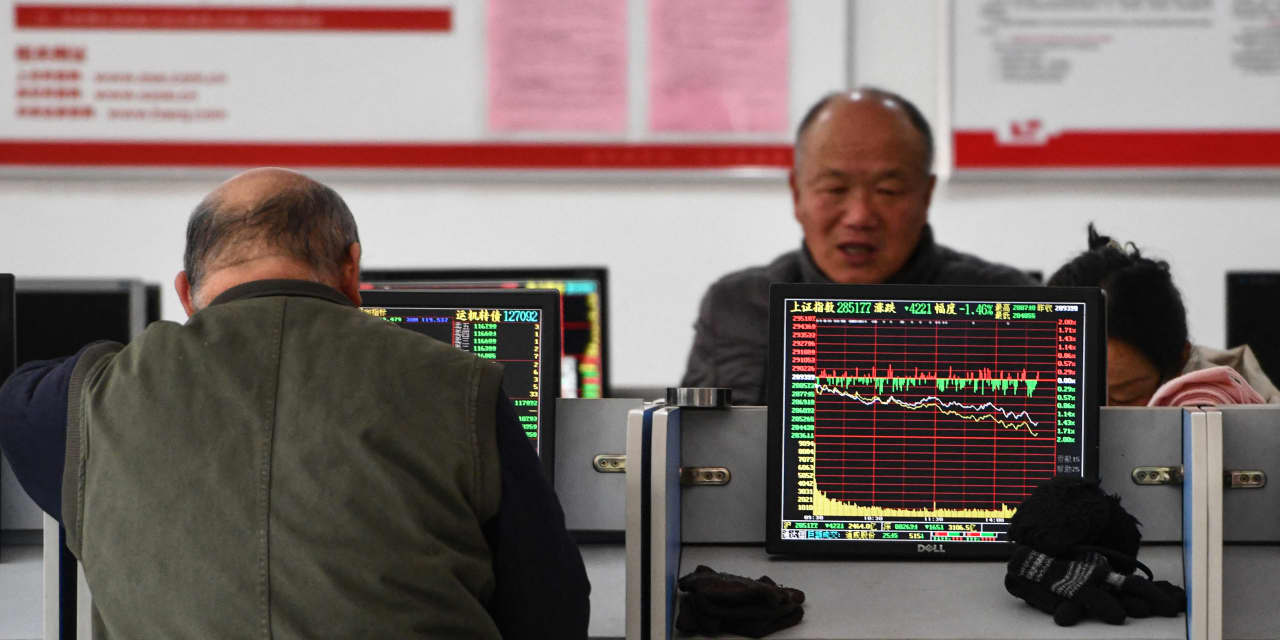Chinese stocks are so cheap that some fund managers see the market primed for a bounce—even as investors remain skeptical about the country’s ability to grapple with the structural challenges impinging on its longer-term growth prospects.
The MSCI China index has lost more than $2 trillion in market cap since its high in February 2021. The
iShares MSCI China
exchange-traded fund is down more than 50% since that point.
The result: China is one of the cheapest markets in the world. The MSCI China index trades near 12 times earnings, compared with 15 times for the MSCI Emerging Markets index and 20 times for MSCI World.
Few money managers have turned optimistic about China’s economic prospects. But with stocks at such low levels, money managers see Beijing creating a floor under the market as policymakers roll out measures to stabilize the economy.
“Developments on the ground must worsen versus an already deflated baseline to drive further lows in the market. Failure to do so may trigger involuntary short-covering, a bit like what we saw with unprofitable speculative tech stocks in mid-2023 when people were panicking about higher interest rates,” says Howie Schwab, manager of the Driehaus Emerging Markets Growth fund.
The bounce will likely be smaller than what the market saw in late 2022 as China eased Covid restrictions. Many investors were underwhelmed by the gains then, and could use any run-up now as an opportunity to exit the market. But the market could still see a 10% pop, much like the rallies Japan saw during its deflationary period.
Others seem to be ascribing to that view.
Bank of America
strategist Michael Hartnett describes China as “the world’s most enticing contrarian long trade.” Nearly $12 billion in inflows over the past week moved into the world’s second largest economy as Beijing rolled out more efforts to bolster growth.
The People’s Bank of China cut its reserve rates by 0.50%, double its usual cuts, to revive lending and told the country’s financial institutions to support cash-strapped property developers.
Along with that came comments from officials pledging to support the market and report of a possible package that marshals state-owned enterprises to buy onshore stocks. All this suggests Beijing may be getting the message it needs to do more, says Ramiz Chelat, who manages
Vontobel’s
emerging markets equity strategy. He has selectively added to Chinese stocks but is still underweight compared with his benchmark.
“This is a short-term floor and support but for a sustained rally, you need to have more substantial consumer stimulus or resolution to the local government debt issue,” he adds.
Chelat says he would like to see earnings downgrades in various sectors of the Chinese market wane. That could take time in strategic areas like semiconductors and renewables where Beijing has invested aggressively, and that are now facing too much capacity and deflationary pressures.
Others want to see more consistency in Chinese policy to grapple with its structural issues like debt and demographics, along with actions to revive private sector confidence.
The Chinese government doesn’t have a lot of credibility with investors. Harsh Covid restrictions and a technology crackdown hit markets hard and were followed by policy flip-flops. After signaling it had winded down its tech crackdown, the government introduced draft regulation suggesting further restrictions to online gaming that hammered internet stocks.
That’s left investors waiting for more concrete signals of improvement rather than just supportive words from officials, especially as Beijing has been restrained in its stimulus efforts.
In a briefing this week, Gavekal property analyst Rosalea Yao said Beijing needs to do more to stabilize its property sector as home sales have fallen from RMB18 trillion to RMB12 trillion in the last couple of years and property price declines are still widespread.
Beijing’s measures to woo prospective home buyers have done little to shore up the market. While Beijing is encouraging local governments to turn unfinished or idle projects into affordable rentals and sales properties, Yao says external funding is needed as developers are running out of cash.
A stabilization in the property market, which accounts for roughly a quarter of economic activity, is seen as a prerequisite for a sustainable broader recovery.
“The first leg of a rebound can be driven by technical factors because the market is so oversold, but eventually we have to see green shoots in the economy and we haven’t seen that,” says Vivian Lin Thurston, a manager for William Blair’s Emerging Markets Growth strategy. “Our analysts just came back and said things on the ground seem worse than when they were there last.”
While Thurston is spending more time looking at Chinese stocks, it will take more meaningful economic improvement—such as stabilization in existing and new home sales after two years of declines—to make her do more than just look.
Write to Reshma Kapadia at [email protected]
Read the full article here




